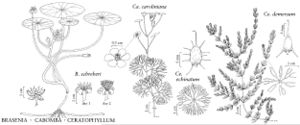Ceratophyllum
Sp. Pl. 2: 992. 175.
Gen. Pl. ed. 5, 428. 1754.
| Taxon | Illustrator ⠉ | |
|---|---|---|
 | Ceratophyllum demersum Ceratophyllum echinatum Cabomba caroliniana Brasenia schreberi | John Myers John Myers John Myers John Myers |
Plants, submersed perennials. Stems suspended or anchored by branches buried in substrate; branches 0-3 per node. Leaves 3-11 per whorl, cauline; petiole inconspicuous. Leaf-blade simple or forked into linear-filiform, denticulate segments. Inflorescences extra-axillary, alternating with leaves. Flowers: bracts basally connate, foliaceous; pedicel less than 1 mm or essentially absent. Staminate flowers: anther 2-locular, connective projecting as apical appendage. Pistillate flowers: ovary tapering to persistent, spinelike style; ovule pendulous. Achene ellipsoid, moderately compressed, surface smooth or tuberculate, basal or marginal spines (or both) present or absent, terminal spine present, marginal wing present or absent. x = 12, 19, 20.
Discussion
Useful in identification of species of Ceratophyllum are leaf-forking characteristics. Leaves with no forking are "0-order"; they consist only of a primary segment. Those forking once are "1st-order"; their ultimate segments are secondary. Those in which at least one secondary segment forks are "2d-order"; their ultimate segments are tertiary. Those in which at least one tertiary segment forks are "3d-order"; their ultimate segments are quaternary. Those in which at least one quaternary segment forks are "4th order."
Plumule features used in the key below are observable through dissection of softened (soaked) seeds removed from achenes.
Selected References
None.
Key
| 1 | Forking of largest leaves 1st or 2d order (rarely 3d order); leaves coarse-textured, marginal denticles usually strongly raised on broad base of green tissue; achene margin wingless, basal spines or tubercles 2 (rarely absent). | Ceratophyllum demersum |
| 1 | Forking of largest leaves 3d or 4th order; leaves fine-textured, marginal denticles not raised on broad base of green tissue, sometimes nearly absent; achene margin winged, spines (0–)2–20, 0.1–6.5 mm, basal spines 2 (rarely absent). | > 2 |
| 2 | First leaves of plumule simple; achene body (excluding terminal spine) 3–4.5 mm; Florida, Georgia, North Carolina. | Ceratophyllum muricatum |
| 2 | First leaves of plumule forked; achene body (excluding terminal spine) 4.5–6 mm; widespread in North America. | Ceratophyllum echinatum |